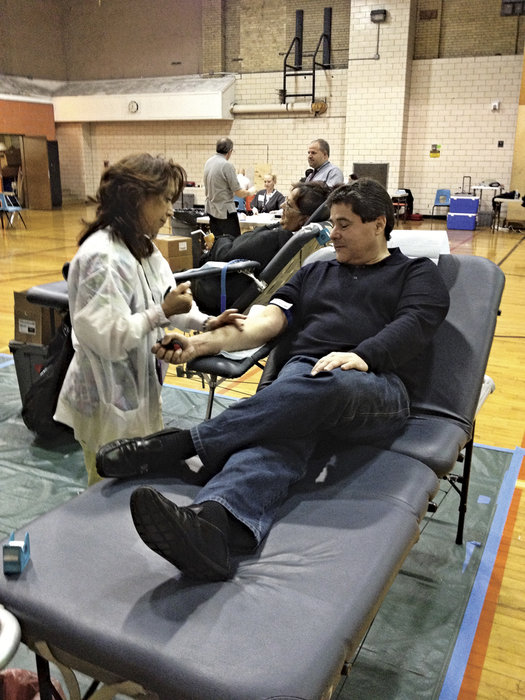Twelve years ago, when West New York businessman Otilio Leon was diagnosed with lymphoma, a form of cancer that affects white blood cells, his doctors told him he had six months to live. Leon passed away in September, having lived 11 years and six months longer than he was supposed to.
Following his death, Leon’s son, West New York Police Detective Robert Leon, decided to that in order to honor his father’s memory and provide awareness about lymphoma and blood disease in general, he would organize a citywide blood drive.
Leon, who said he hopes to one day be “half the man my father was,” proposed the idea at a joint meeting of the West New York Police Benevolent Association (PBA) and the Police Supervisors Association (PSA), where it was met with enthusiasm and support from fellow officers.
And so the blood drive was held at two locations, Town Hall and the gymnasium at Memorial High School, on Wednesday from 8 a.m. to 6:30 p.m. Bad weather was expected to hurt attendance, but the five donating stations set up at the high school were consistently filled, while reports from Town Hall said that nearly the entire police force was donating.
“Unless your life has been touched by cancer, especially lymphoma, you can’t know how important blood is.” – West New York Detective Robert Leon
____________
Leon said that his father was a model citizen, who emigrated to West New York from Cuba in 1962. He owned an embroidery business, and sponsored and coached one of the town’s little league teams for many years.
High-profile donations
Mayor Felix Roque was on hand to donate, and said that his background in medicine contributed to his wishing to participate.
“I’m really doing this because I’m a doctor, I actually don’t like needles very much,” said Roque. “But blood is so important. This is a no-brainer, it’s like giving the gift of life.”
Other high-profile town officials were on hand for the event as well, including Police Director Michael Indri and Superintendent of Schools John Fauta.
“I lost my dad a while back, so I understand how important this is,” said Indri. “Blood is really important. We’re happy to come through for a good cause.”
PSA president Lt. Mark Flores and PBA president Detective Tommy Mannion also attended to support Leon, and said that both their organizations were interested in making the blood drive an annual thing.
“We’ve done it sporadically in the past, but I think we’re going to try and make it an annual thing now,” said Flores.
The importance of blood
According to the American Red Cross, someone in the United States requires blood almost every two seconds, meaning that nearly 44,000 donations are needed per day. United States law limits a donation to one pint of blood, although nearly three pints are needed for an average blood transfusion.
However, the amounts needed vary on a case to case basis. For example, a single victim of a bad car accident can require up to 100 pints to save his or her life, even though the human body can only hold up to about 10.
While he was sitting on the donation table, Roque recounted an incident in 1994 when he was on his way to an Army base in upstate New York. After witnessing a vicious car crash, Roque stopped to examine the vehicle’s driver. Noticing that he was losing blood, Roque used materials strewn about his trunk to build a makeshift intravenous line into the man’s arm to hold him over until an ambulance arrived.
“I don’t know whether he survived,” Roque said, “but it goes to show you how important it is to be ready.”
Leon said that he was grateful to the mayor, as well as the Board of Education, for their support of the blood drive, but saved his most special thanks for his fellow officers.
“There are no words to describe how much it means to me,” he said. “But the truth is that it matters way more to people who need the blood.”
Dean DeChiaro may be reached at deand@hudsonreporter.com
